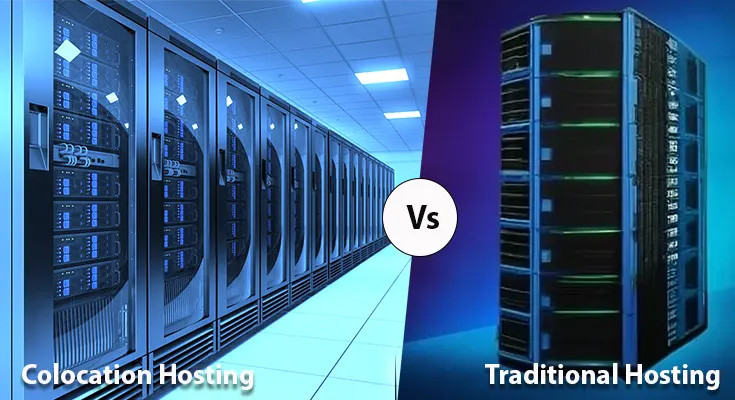In today’s digital age, a robust and reliable IT infrastructure is no longer a luxury – it’s a necessity. Businesses of all sizes depend on their servers to operate efficiently, store critical data, and power their online presence. However, when it comes to choosing the right hosting solution, companies often face a problem: traditional hosting, it support london, or colocation?
Traditional hosting, particularly shared hosting, offers a convenient and affordable entry point. However, it comes with limitations in terms of control, security, and scalability. On the other hand, colocation provides a more hands-on approach, offering businesses greater control and flexibility over their IT infrastructure.
As a result, we’re witnessing a growing trend of businesses migrating from traditional hosting to server colocation. Here are five compelling reasons why:
1. Enhanced Security and Control
Data security is a paramount concern for every business. Traditional hosting often involves sharing server resources with other companies, which can pose security risks. In a colocation environment, your servers reside in a secure, physically controlled data center. You have complete control over access and security measures, allowing you to tailor them to your specific needs.
Colocation data centers boast advanced security features like:
- 24/7 security personnel: Trained professionals monitor the facility to deter unauthorized access.
- Biometric access control: Entry is restricted to authorized personnel using fingerprint scanners or retina scans.
- Video surveillance: High-definition cameras keep a watchful eye on all areas of the data center.
- Advanced fire suppression systems: These sophisticated systems can extinguish fires quickly and minimize damage.
- Environmental controls: Precise temperature and humidity control ensures optimal server operation and prevents overheating.
Furthermore, colocation service mumbai providers typically offer a range of security services, such as intrusion detection and prevention systems, to further safeguard your data. This level of control and robust security architecture are invaluable for businesses dealing with sensitive information or adhering to strict compliance regulations.
2. Unmatched Scalability and Flexibility
Traditional hosting plans often restrict the amount of storage, processing power, and bandwidth available. As your business grows, you may find yourself reaching the limits of your plan and facing the hassle of migration to a more robust package.
Colocation offers unmatched scalability. You have the physical space and power capacity to add or remove servers as needed. Need to handle a surge in website traffic? Simply upgrade your server hardware within the colocation facility. Anticipating a period of slow growth? You can scale down your server resources without being locked into a fixed hosting plan.
This flexibility empowers businesses to adapt their IT infrastructure to meet their evolving needs. Colocation providers often offer a variety of pre-configured server options and custom configurations, allowing you to find the perfect solution for your specific requirements.
The Power of cPanel Dedicated Servers:
When it comes to managing your colocated server environment, cPanel Dedicated Servers offer a powerful and user-friendly solution. cPanel is a web-based hosting control panel that allows you to easily manage your websites, email accounts, databases, and other server resources through a graphical interface. This eliminates the need for complex command-line commands, making server management accessible even for users with limited technical expertise.
3. Superior Network Performance and Reliability
Every business owner understands the importance of website uptime and fast loading speeds. Traditional hosting providers rely on shared network resources, which can lead to performance bottlenecks and slowdowns, especially during peak traffic periods.
Colocation data centers are equipped with high-speed, redundant network connections. This ensures a reliable and consistent connection for your servers, minimizing downtime and latency issues. Additionally, colocation providers often offer multiple network options from various carriers, allowing you to choose the most reliable and cost-effective option for your needs.
By housing your servers in a colocation facility, you gain direct access to these high-performance networks, significantly improving website loading times and user experience. This translates into increased customer satisfaction, improved conversion rates, and a competitive edge in the online marketplace.
4. Cost-Effectiveness for Businesses with Specific Needs
At first glance, traditional hosting may appear cheaper than colocation. However, businesses with specific requirements often find that traditional hosting becomes expensive in the long run. Limited storage, bandwidth restrictions, and the need for frequent upgrades can drive up costs quickly.
Colocation offers a more predictable cost structure. You pay a monthly fee for the space, power, and bandwidth you utilize. This allows for better budgeting and eliminates hidden costs associated with traditional hosting plans.
Furthermore, colocation facilities handle the responsibility of maintaining the physical infrastructure, including power, cooling, and security. This frees your IT staff to focus on core business functions, leading to increased efficiency and potential cost savings.
For businesses with large data storage requirements, high-performance needs, or specialized security concerns, colocation can be a cost-effective solution in the long run.
5. Peace of Mind and Focus on Core Business
Managing an in-house server room can be a resource-intensive task. It requires dedicated staff to handle hardware maintenance, power management, and security measures. Traditional hosting, on the other hand, can leave businesses feeling a lack of control over their data and infrastructure.
Colocation offers the perfect middle ground. You retain complete control over your servers and data while outsourcing the responsibility of managing the physical infrastructure. Colocation data center providers handle all the behind-the-scenes tasks, including:
- Facility Management: Maintaining a secure and environmentally controlled data center environment.
- Power and Cooling: Providing reliable power and maintaining optimal cooling temperatures for your servers.
- Network Connectivity: Ensuring high-speed and redundant network connections for your servers.
- Physical Security: Implementing strict access control measures and 24/7 security personnel to safeguard your equipment.
By offloading these critical tasks to a colocation provider, you free up your IT staff to focus on core business functions. This allows them to focus on strategic initiatives like application development, user experience optimization, and data security projects that directly contribute to your business growth. The peace of mind that comes with knowing your IT infrastructure is in the hands of experienced professionals allows you to focus on what you do best – running your business.
In conclusion, colocation offers a compelling alternative to traditional hosting for businesses seeking enhanced security, scalability, performance, and cost-effectiveness. The ability to tailor your IT infrastructure to your specific needs, coupled with the peace of mind that comes with a secure and reliable data center environment, makes colocation a strategic choice for businesses of all sizes.





